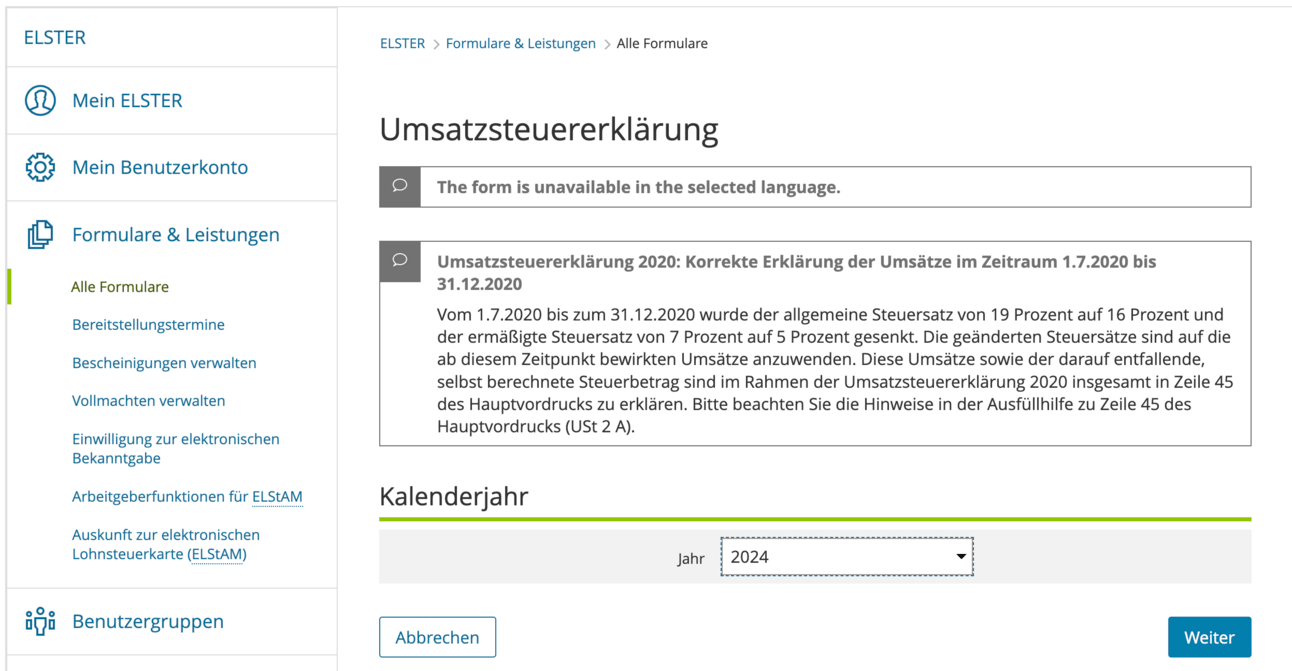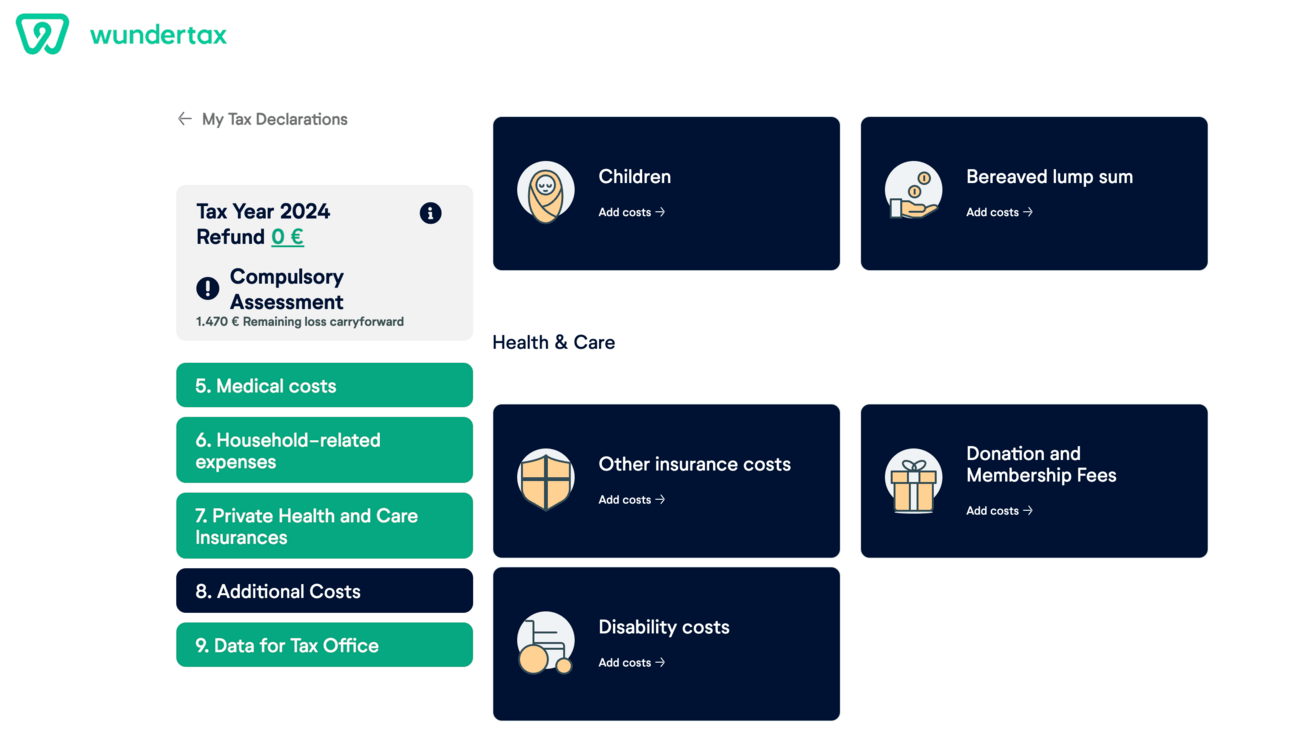Understanding how to file a tax return in Germany isn’t just a challenge for newcomers — it can be confusing even for those who’ve lived here for years. Between mandatory and voluntary declarations, deductions and filing deadlines, there’s a lot to unpack. Now that German tax offices have started processing 2024 returns, it’s a great moment to file yours — the earlier you submit, the sooner your assessment (and refund, hopefully) will arrive.
In this guide, we’ll break down the fundamentals: who’s required to file a tax return in Germany, why it’s often worth it even if you’re not obligated, and what deadlines apply depending on how and when you file. We’ll also walk through your options for filing a tax return in Germany and explain how to choose the right approach for your situation.
Note: this post contains affiliate links, which are marked with *.
Why You Should File a Tax Return in Germany
According to the official data, around 85% of people who file a tax return in Germany get money back, and the average tax refund is €1,063. One reason for this is the system of flat-rate deductions (Pauschalen), which reduce your taxable income without needing to submit receipts. These include things like the employee allowance, commuter allowance, and the home office lump sum. The only thing you need to do to get that money back is file a tax return! And beyond these standard amounts, there’s a whole world of other deductions that can boost your refund — I’ll break those down in part two of this tax guide (coming soon!), which is all about deductions you can declare in your tax return in Germany.
Filing a tax return in Germany can be especially worthwhile if you only worked part of the year. For instance, if you moved and started working in Germany in August, your salary from those few months is taxed as if you earned your monthly salary for the entire year, which means you are likely overpaying in income tax. Filing a tax return sets the record straight — and you can expect to get that overpaid tax back.
I’ve filed a tax return every single year since arriving in Germany, and I got money back six out of seven times — it’s one of these admin tasks that has reliably paid off. If you’re unsure whether it’ll be worth it in your case, there are ways to check this before you actually file a tax return in Germany — more on that below.

Tax returns are not as scary as they seem — especially if you choose the right filing option.
Who Has to File a Tax Return in Germany (and Who Doesn’t)
There’s a common misconception that once you file a tax return in Germany, you’re automatically required to keep doing it every year. That’s not how it works! In most cases, you can decide each year whether you want to file a tax return — unless one of the conditions below applies and filing becomes mandatory for that year.
You’re required to submit a tax return in Germany if:
You earned more than €410 in side income that year (from freelance work, rental income, capital gains, etc.)
You received income replacement benefits like Elterngeld, Krankengeld, or Kurzarbeitergeld totaling over €410 that year
You had more than one employer at the same time
You or your spouse are in tax class III/V or IV/IV with factor
You received a severance package or similar special payment
You applied for tax allowances (Freibeträge) in advance to reduce your monthly withholding
You have income from abroad or opted for unlimited tax liability in Germany
You’re self-employed or run a business
You received investment income that wasn’t already taxed at source (like from foreign accounts)
You were asked by the Finanzamt to file a return (they can request it anytime)
If none of these situations apply to you, then filing a tax return in Germany is voluntary. But as we’ve already seen, “voluntary” doesn’t mean unnecessary — for most people, it still ends with money back in your account.
Deadlines to File Your Tax Return in Germany
If you’re required to file a tax return in Germany — for example, because you’re self-employed, had multiple employers, received Elterngeld, or earned more than €410 in side income — the deadline is July 31 of the following year. For the 2024 tax year, that means your German tax return needs to be submitted by July 31, 2025. If you’re working with a tax advisor or a Lohnsteuerhilfeverein, the deadline to file your tax return is automatically extended — in this case, until February 28, 2026.
For everyone filing a tax return in Germany voluntarily, the timeline is much more generous: you have four full years to submit your return. So your 2021 tax return can still be filed until the end (December 31) of 2025, your 2022 tax return until the end of 2026, and so on.
If you’re required to file a tax return in Germany but need more time — and you’re not using a tax advisor — you can request an extension from your local Finanzamt. Just make sure they receive your request before the deadline. Extensions to the tax return deadline in Germany aren’t granted automatically, and they definitely won’t be considered after the fact. If you’re required to file and miss the deadline, the Finanzamt can charge a late fee of 0.25% of the unpaid tax per month, with a minimum of €25 per month.
How to File a Tax Return in Germany: Your Options, Explained
There are a few different ways to file your tax return in Germany — ranging from a completely free official tool to guided software and full-service help. Here’s how they compare.
ELSTER: The Only Way to File a Tax Return in Germany for Free
ELSTER is the official German tax platform provided by the Finanzamt – it’s completely free and, since last year, partially available in English. However, the navigation can be clunky, and there’s not much guidance or suggestions along the way – this is not a system designed to help you maximize your deductions. Technically, it’s partially available in English — but in practice, you’re only a couple of clicks away from “This page is not available in the selected language.” Even just activating your account can feel like a test of endurance — your activation code is sent by physical mail and can take a week or two to arrive. If you’re ready to put up with all of that and you’re well-versed in how tax deductions in Germany work, ELSTER might be a way for you to file your tax return in Germany for free. Otherwise, keep reading.
Tax software: The Best Way to File a Tax Return in Germany for Most People
If your tax situation isn’t too complex, guided tax software is often the most time- and cost-efficient way to file a tax return in Germany. These tools walk you through the return step by step, explain what each field means, tell you whether you’re required to file or not, and often flag tax deductions you might not have thought of. You can fill everything in for free, see your estimated refund, and only pay if you choose to submit. The whole process is usually quick — if your case is straightforward, you can be done in 20–30 minutes. The fee for filing a tax return is typically €35–45, and it’s tax-deductible next year, so the real cost ends up being lower.
Personally, I’ve had good experience filing my German tax return with Wundertax*, also known as germantaxes.de (€34.99 for a tax declaration), and I’m planning to use it again this year. The user experience is great, the process is quick, and it supports a wide range of income types — including side jobs, freelance and self-employed entrepreneurship. What I also appreciate is that it gives you a clear, structured overview of possible tax deductions — basically a list you can go through and decide what you’d like to fill in.
Taxfix (€39.99) is another good option for filing your tax return in Germany – it’s available in English, has a very intuitive interface, and works well for employees, students, or anyone with simple returns. I used it many times and always had good experience with it. However, it doesn’t support self-employment or freelance income, so it’s not suitable if you’ve earned money from a side business.
SteuerGo (€34.95) is another option that’s available in English — plus Polish, Russian, Romanian and Croatian. It supports a wider range of income types, including freelance work and capital gains. The interface isn’t quite as slick as others, but it’s functional and gets the job done. It’s also the most affordable pick in this category.
WISO Steuer (€45.99, or €35.99 with annual subscription) is more of a power-user tool for filing a tax return in Germany. It gives you access to everything the official tax forms cover, but it doesn’t guide you step by step like other software, and it’s only available in German. It’s a solid option if you want more control or need to handle complex income like self-employment or investments. If you’re just filing a basic tax return, it’s probably more than you need.
And one extra budget tip: every year around Christmas, Aldi sells an Aldi-branded tax software for just €4.99, either as a CD (yes, in 2025) or a download. It’s a no-frills software and it’s only available in German, but if your tax return is straightforward, and you don’t mind downloading the software, it will do the job. It’s too late to get it this year, but you can keep it in mind as a low-cost option for your future tax returns.
Lohnsteuerhilfeverein: Personalised Help with Your Tax Return in Germany That Won’t Break the Bank
If you’re employed and want more support for filing your tax return in Germany than what tax software offers — but don’t need a private tax advisor — a Lohnsteuerhilfeverein (wage tax assistance association) can be a good in-between option. These are non-profit organisations that help you prepare and file your tax return in Germany and offer year-round advice. The annual fee is income-based and usually ranges from €50 to €400: for example, someone earning between €40k and €50k/year would pay €185, while someone earning between €70k and €80k/year would pay €245. That fee includes preparing your tax return, submitting it, and responding to the Finanzamt if they follow up with questions. There’s also a small one-time joining fee (usually around €10–15).
There are some limitations to who can use these services to file a tax return in Germany – they’re only available to employees, pensioners, civil servants, and people receiving certain social benefits. Lohnsteuerhilfevereine can’t help if you’re self-employed, have income from abroad, or significant rental or investment income. Even small freelance jobs on the side can disqualify you — so it’s important to check before joining.
The biggest tax association network is VLH (Vereinigte Lohnsteuerhilfe e.V.) – you can search for a local branch here. This is a solid low-effort option if your return is a bit more complex and you’d rather not file your German tax return through software, but you’re still not at the point of needing a full tax advisor.
Tax Advisor: If You Want to Fully Outsource Your Tax Return
If your situation is complex — maybe you have a company, have multiple income sources, own property, earn money from abroad, or just don’t want to deal with the paperwork — working with a tax advisor to file your tax return in Germany can absolutely be worth it. This is the most hands-off option: you hand over your documents, answer a few questions, and they take care of the rest.
A good tax advisor can navigate complicated rules, spot deductions you might overlook, and handle communication with the Finanzamt for you – but that level of service comes at a cost. Fees for filing a tax return in Germany with a tax advisor are regulated but flexible, and depend on how complex your tax return is, how much time it takes, and how much money is involved. You can expect anything from around €300 to well into the thousands. It’s not the default choice for most people — but if your income situation is complex or you simply don’t want to bother filing a tax return yourself, it can be money well spent.
I hope this made filing your tax return in Germany feel a little less overwhelming — or at least gave you a clearer idea of what to expect. Whether you’ll be filing with ELSTER, using a software tool, or handing it off to someone else, now you’ve got a better sense of your options.
If you want more practical, plain-language guides on how to save money in Germany, from choosing right banks and credit cards to saving money on health insurance or getting great deals on your everyday shopping, subscribe to Smart Living newsletter and get the next post straight to your inbox.
Ad/anzeige disclosure: Some of the links in this article are affiliate links. If you make a purchase through them, I’ll earn a small commission at no extra cost to you. I only recommend products and services I’ve personally tried and stand behind. When you use these links, it helps support the website and keeps my content free. Thank you for your support!





